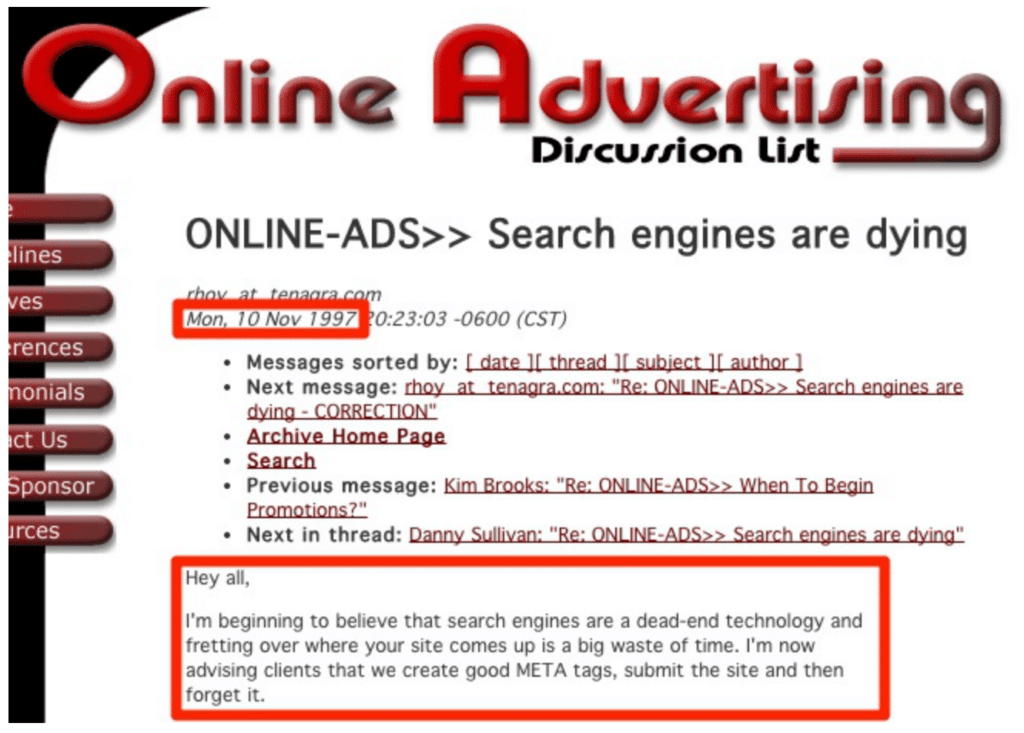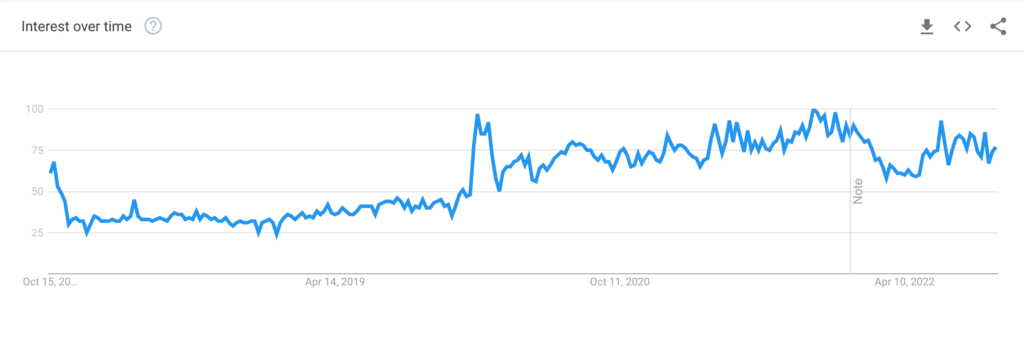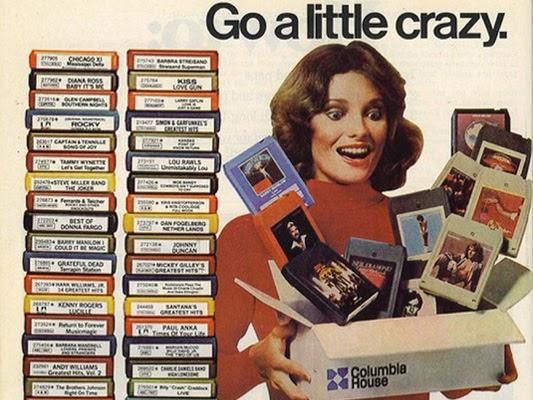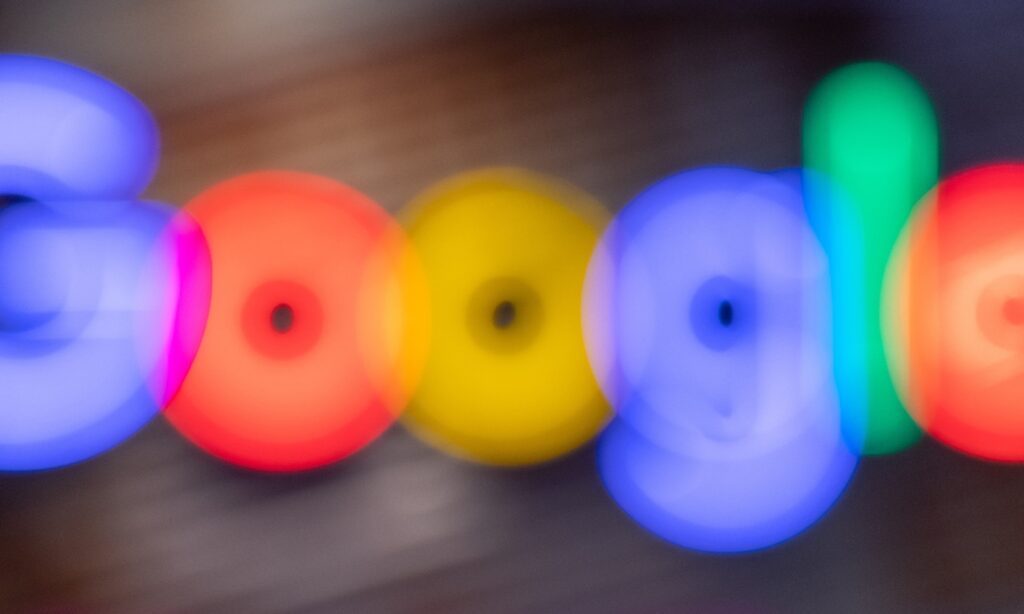Believe it or not, we have been hearing that SEO is dead every year since Richard Hoy first claimed it on the Online Advertising Discussion List in 1997, and yet, SEO is still one of the most in-demand digital marketing services and skills.

The most common reasons given for why SEO is dead are updates to Google’s search algorithm that can make marketers panic at the potential for decreased traffic. Arguably the most impactful updates are 2011 (Panda), 2012 (Penguin), 2013 (Hummingbird), and 2015 (Mobilegeddon). There have been dozens of other updates that tend to get fewer headlines now. And yet, with all these changes, SEO is alive and well – even growing.

The early battles for search engine supremacy were all focused on which search engine provided the fastest and most relevant results. We all know that Google won that battle. Well, all of us but the 2.8% that insist on using Bing or the 0.67% that are scared of the data Google is collecting so they are using DuckDuckGo.
I don’t think SEO will die anytime soon, however, Google search as we know is heading towards the technology retirement community of Myspace (you might be surprised to hear that it still has 6 million users), Vine, fax machines, and the Sony Walkman. Google search’s death won’t be because Google figured out how to punish the black hat SEO specialist gaming search results. Rather, it will be because users abandon how search is done as we know it. It’s already happening.
If Google doesn’t evolve, it will wonder where its users have gone and along with them, its primary source of revenue – paid search advertising. That’s a huge financial threat to Google.
The changing landscape of how users “search” shouldn’t be a surprise for anyone who is tracking digital innovation. The two most significant evolutions in search have been in part influenced by Google – voice search, and video search results. Ironically, they both could lead to the end of Google search as we know it.
Voice Search
In 2018, the hottest topic in search marketing was optimizing for voice search to address Google and Amazon pushing Alexa and Google Home into our digital user pathway. Instead of typing or thumbing our way on browsers, we were all being told to “ask” Alexa or Google. Apple users had already been saying “Hey Siri!” in search of answers since 2011. However, voice search and audio results tend to underwhelm because of the lack of choices and the serotonin stimulus of scrolling for results (yes, only the first few results really earn the click but sometimes it’s nice to know there are 84,200 results on Google for “best yoga mat for middle-aged men”). Asking Alexa or Siri to play a song or tell us the weather is all well and good but asking her to tell us “how to wax skis” leaves us looking for more options.
There is no denying that using voice search instead of text search with a search engine has caught on with over 40% of Americans using voice search and over 70% preferring using voice instead of text for searching. All we have to do is look at the search history of a young elementary school kid to see how they are clearly using voice search to find the answer to complex questions like “who would win a fight between an alligator and a shark”. They might not know advanced writing and spelling yet but they can speak fluently and their search history reflects it.
Video Search
It didn’t take long for people to migrate toward video results for their search queries. Anyone who has taken on the tasks of home repairs has learned that with a quick search on YouTube that they can repair their broken garbage disposal, change the lightbulb in a car headlight, and for me, fix the leak under the bathroom sink. Does your child want to learn how to play Ed Sheeran songs on a piano? Yes, there is a tutorial video on YouTube.
YouTube is a video-sharing and social media platform, however, after being acquired by Google in 2006, it didn’t take long for the platform to become the second most visited website (behind the Google Search home page). Digital marketing experts like to say that YouTube is the second most popular search engine. However, that isn’t entirely accurate. Youtube is the second most visited website and technically isn’t a search engine. Youtube is a database of videos and we can search for videos within that database. That said, YouTube did teach us all to be comfortable with searching for video content for our entertainment and information queries.
The Second (and Third) Digitally Native Generations
This brings me to my next point, the kids today. Actually, let’s first talk about the kids from ten years ago. Ten years ago if I wanted to promote the success of the high school soccer team I coach, I would post a photo and game highlights on Facebook and hundreds of students and family members would like and comment. Four years later the engagement with the Facebook post was down 70%. However, a post on Instagram was starting to get traction. Four more years later and Facebook followers stop growing and the only people to engage with posts are Millennial alumni, their parents, and grandparents. Meanwhile, Instagram started growing and the kids began connecting with each other on Snapchat. Two years later, Instagram is now stagnant and it seems everyone is scrolling on TikTok.
Why is this all relevant to the inevitable decline of Google search? Because of the evolution of social media platform adoption and its usage by Generation Z and the younger Generation Alpha (yes, Alpha). These two generations have never used Facebook and liken it to how Generation X considered 8 Track Tapes as they collected piles of now obsolete Compact Discs.

Think about that. The second generation of digital natives don’t use Facebook and are already bored and leaving Instagram. They are spending their time and a significant percentage of their lives on TikTok – with its video content covering just about every entertainment and information topic a user needs or wants.
The Death of Google Search
A recent discussion at our agency led to our Generation Z staff revealing that their go-to search platform isn’t Google, Bing, Siri, or Alexa…it’s TikTok! “When I need information, I’m already on TikTok so I just search there and scroll through video content. I don’t ‘Google it.’ I TikTok it.”
Let that sink in. And Google better let that sink in too. Generation Z prefers TikTok for “search”.
A couple of months later the New York Times published an article about Generation Z and younger millennials using TikTok as their primary search platform. (Yes, Parallel Path tends to be ahead of the NYT when it comes to having a pulse on digital marketing).
I’m sure Google was already aware of this trend. If not, they are now. At the very least, if Google doesn’t evolve to meet digital natives where they are then advertisers will pull their dollars away from paid search and display advertising. (I don’t think my 14-year-old son has been on an actual website for over a year).
Good marketing is the magical intersection of delivering the right message (content) to the right person (digital users) at the right time (on the device they are using). Clearly, that magical intersection is moving away from Google and towards TikTok and likely future evolutions of digital platforms. Mark Zuckerberg is betting on the Metaverse (although nobody really seems to care other than Zuckerberg)…what’s Google betting on?
All good Marketers should be medium agnostic. Today they need to develop a strategy that aligns with where Generation Z is actually spending their time and keep an eye on where Alphas go next. Paid advertising on TikTok is one way to reach Generation Z consumers but brands and companies also need to think about their SEO strategy for TikTok. While TikTok isn’t a search engine in a classical sense, its users are leaning on its massive collection of video content for answers to their queries. Just like how YouTube was not created to be a “search engine” but became one, TikTok has now become one too. This begs the question for marketers of all brands, what kind of content can a brand create that will not only entertain but also provides answers to the search queries happening on TikTok?
So is Google search dead? Not today but it certainly will become the Facebook of search if Google doesn’t evolve and find a way to attract Generation Z and eventually the third generation of digital natives that will follow them.
As I finished writing this article, my 17-year-old son walked by me and I asked,
“Hey, do you use TikTok to search for information?”
“Yes, all the time, Dad,” he said.
“For what kind of stuff.”
“I don’t know. When I need information.”
“Hey, TikTok, how do I get my kids to spend less time on TikTok?”
